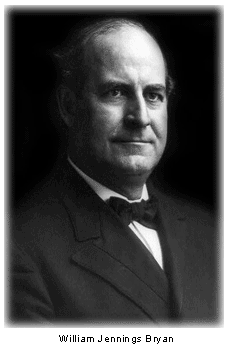William Jennings Bryan was born in Salem, Illinois. He was educated at Illinois College in Jacksonville and Union Law School in Chicago. Bryan practiced law in Jacksonville for several years, but in 1887 moved to Lincoln, Nebraska where he hoped to launch a political career.

William Jennings Bryan was elected to Congress twice, 1890 and 1892. His influence grew rapidly, due largely to his strong advocacy of free silver, opposition to high protective tariffs and oratorical skills. In 1894, Bryan worked to unite the Democrats and Populists in Nebraska, but later lost a bid for a Senate seat. Out of politics, Bryan became the editor of the Omaha World-Herald and traveled widely as a lecturer on the Chautauqua circuit. Popular perception notwithstanding, Bryan`s nomination at the Democratic convention in 1896 was not a spontaneous event fueled by his "cross of gold" speech. The gathering was electrified by his performance, but Bryan`s handlers had long been at work securing votes from the delegates. His advocacy of free silver later brought him the Populist Party`s nomination. During the campaign, Bryan became the first candidate to unabashedly seek voter support. He traveled thousands of miles by train and delivered hundreds of speeches, stopping even in the smallest of towns. His oratorical prowess earned him the nickname "boy orator of the Platte," but his detractors liked to point out that the Platte River was only six inches deep and a mile wide at the mouth. Bryan`s limited message was instrumental in his loss to William McKinley, an event that ushered in another era of Republican leadership. Under Bryan`s influence, the Democratic party underwent a dramatic change. The earlier Jacksonian legacy was one dedicated to limited government, but the party from 1896 onward promoted a more expansive role. In 1898, William Jennings Bryan volunteered to serve with a Nebraska regiment in the Spanish-American War. He would later become a vocal critic of that conflict and the wave of imperialism it unleashed. William Jennings Bryan was nominated by the Democrats for a second time in 1900. He insisted upon campaigning again on the silver issue, which had passed its prime and cost him the support of many eastern party members. Anti-imperialism emerged as the Democrats` leading cause, but the topic resonated poorly with the electorate. In 1901, Bryan founded the Commoner, a weekly newspaper, which he published for 12 years. He also maintained a busy public speaking schedule, which helped to ensure his popularity in Democratic circles despite his two losses. In 1908, William Jennings Bryan was nominated for a third time, but lost to Republican William Howard Taft. Recognizing that his presidential desires would never be fulfilled, Bryan helped instead to engineer the nomination of Woodrow Wilson in 1912. He was rewarded by an appointment to secretary of state. Bryan`s most notable contribution was the negotiation of arbitration treaties with 30 nations that provided for a "cooling off" period as a way to avoid war. Bryan was a staunch supporter of neutrality at the outbreak of World War I. He later resigned his office in protest over Wilson`s actions following the sinking of the Lusitania. William Jennings Bryan remained active in a variety of causes, including peace, women`s suffrage, prohibition, and Christian Fundamentalism. In 1925, he served as an associate counsel in the trial of John Scopes, a Tennessee instructor accused of teaching evolution in a public school. Bryan took the stand and underwent a withering cross-examination by Clarence Darrow. Bryan`s side won the case, but he became the subject of widespread ridicule. He died less than a week later. William Jennings Bryan was not a deep or original thinker, but a sincerely dedicated public servant. He was one of the most prominent figures of his day, but his political appeal was too limited to allow him to become a successful presidential candidate. Many of the goals he failed to achieve – women`s suffrage, a graduated federal income tax, prohibition, and the popular election of U.S. senators – would later be enacted into law.